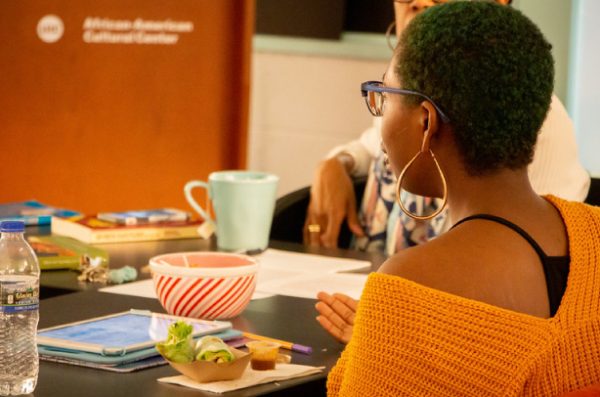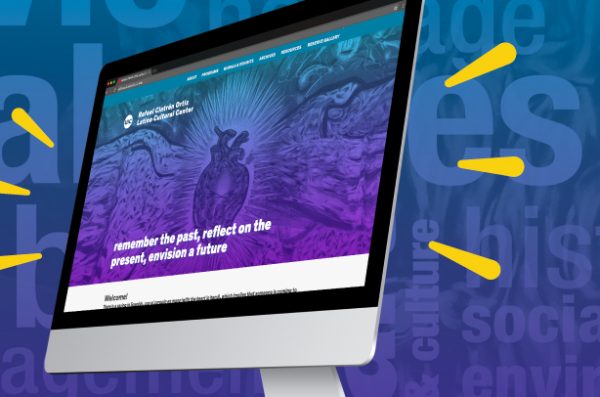UIC’s Centers for Cultural Understanding and Social Change (CCUSC, or the Centers) invite you to connect. Born from student and community activism, the Centers serve as spaces of learning, engagement, and advocacy for the entire university. Through their efforts, the Centers promote the well-being of students who are members of marginalized groups, amplify their sense of belonging, and contribute to the intellectual and cultural life of the campus in a variety of ways.
The CCUSCs offer several opportunities for students enrolled in UIC’s First-Year Seminars to engage. Here are a few:
Spaces of Belonging Heading link
Recognizing that new students need less formal and more intimate ways of connecting with their peers and learning about UIC, the Centers have created community spaces where students can cultivate a sense of belonging and begin to find a place to call home:
Spaces To Gather, Study, Learn, Rest Heading link
The Centers provide physical places for programs, meetings, events, and for students to study, gather, eat their lunches, or peruse books and resources; student organizations can also reserve space for their events or meetings. You can visit in two ways:
Spaces To Gather, Study, Learn, Rest Heading link
In-Person Visits

Include visits to the Centers’ physical space as a part of your coursework. Some of the Centers have programming space where you can hold a class. Contact individual Centers ahead of time to schedule group or class visits, or to inquire about meeting in a Center space. Because many classes may be making such requests in a given semester, you may also want to consider inviting someone from a Cultural Center to talk to your class.
Website Visits

For the Fall 2020 semester and for as long as the Centers are operating remotely, consider including visits to the Center websites as part of your coursework.
-
Black Cultural Center
-
Arab American Cultural Center
-
Asian American Resource and Cultural Center
-
Disability Cultural Center
-
Gender and Sexuality Center
-
Rafael Cintrón Ortiz Latino Cultural Center
-
Women's Leadership and Resource Center
-
Attend Our Public Programs Heading link

The Centers offer a variety of programs – film series, conversation series, lectures, workshops, etc. – that are informed by academic scholarship as well as by current political and cultural concerns. Students are encouraged to think about how the Centers’ programs address issues that are not necessarily explored in their chosen areas of study in order to deepen their engagement in the respective communities’ collective life and support the various struggles for liberation. Whether or not students are undecided about their majors, the Centers’ programs can spark curiosity about disciplines and courses that they may wish to explore during their time at UIC.
All of our programs are free, open to the entire UIC community, and committed to accessibility (many events have live captioning, and we welcome other requests). Many Centers continue to offer some virtual and/or hybrid programming.
While each Center’s programs focus on issues and topics that connect to the communities and identities they represent, we are deeply committed to intersectional approaches, and our programming often overlaps. For example, UIC’s Black Cultural Center offers programs that focus on all aspects of Black life. However, the Gender & Sexuality Center may also offer programs that focus on transgender people of color, while the Women’s Leadership & Resource Center might create programs focused on Black women, and the Latino Cultural Center has offered programs on how environmental and climate injustices affect people of color. For this reason, it is a good idea to encourage students to learn about and attend events at more than one Center.
- Check the Centers’ websites or sign up for our email listservs to keep track of everything the Centers are doing for the semester. You can also assign your students to follow the Centers on social media and encourage them to build a relationship with Centers of their choice.
- Consider requiring students to attend Center programs that align with the focus of a particular class, for credit or extra credit.
- With enough notice and planning, the Centers can work with you to bring a guest speaker to your class.
- You (and your department) can also cosponsor a public program.
Join our Tours, Dialogues, and Conversation Series Heading link

Whether students are new to college or to this university, the Centers provide important learning opportunities for engaging issues of cultural difference, inequality, identity, and social justice from the perspectives of marginalized groups. Dialogue and conversations give students a ready entry point to consider the importance of histories, politics, cultural identities, and social experiences in shaping their own identities and those of their colleagues at UIC.
- ArabAmCC: Hiwarat: Public Conversations events
- BCC: Lunchtime Black Table Talk Series: Wednesdays, 12:00-1:00; Ongoing Exhibitions exploring diasporic history, culture, and politics.
- AARCC’s signature programs and events are available on Instagram and AARCC News.
- CAN: Storytelling Circles: Wednesdays, September 9 – 30, 3-4 PM.
- DCC: Unlearning Ableism: DCC Discussions (open to everyone!); and many other public programs. We’re glad to host DCC visits by request (dcc@uic.edu).
- Heritage Garden Tours (suspended for Fall 2020)
- GSC: Queer and Trans People of Color Affinity Space, T-Time Affinity Space, Virtual Art Gallery Tour: GSC Virtual Tours are available by request
- LCC Mural Tours and Civic Dialogues & Virtual Climates of Inequality presentation series
Explore Opportunities for Academic, Leadership and Career Development Heading link

Some first-year students have already decided what they want to study, and of course some are still exploring. For each situation, introducing students to the Cultural Centers will help them understand the many ways that their academic, cultural, and social interests intersect with the work we do, and give them spaces to explore those interests.
Consider inviting Center staff to your course to talk about how they became involved with the Centers, why getting involved with the Centers will enhance the students’ academic experience at UIC, and the ways students can get involved. Here are some of our initiatives:
- BCC: Annual Black Student Leadership Conference – Contact Gaylen Rivers at grivers@uic.edu
- ArabAmCC’s Tamkeen (Capacity Building Program) including the Student Leadership Summer Institute and Center Internship
- Asian American Mentor Program (AAMP)
- DCC’s Community Care Cohort Internship; Contact dcc@uic.edu
- GSC Student Ambassadors Cohort: Leadership program; Contact Moises Villada at moises@uic.edu
- LCC’s Lead.Create.Change Internship Program
- CCUSC Heritage Garden Internship Program
- Diversity Community Engagement Program
Participate in Advocacy Heading link

The Centers are important sites of advocacy and institutional change at the university. The CCUSCs provide incoming students with direct support, connecting them with resources or helping them think through situations they are experiencing; they host and support meetings with student and community groups who are planning educational events and collective action; and they provide ways to get involved and learn about social justice activism at UIC and beyond.
- BCC’s Carver Roots of Justice Sustainability Initiative hosts monthly opportunities for community engagement focused on sustainability and environmental justice.
- AARCC’s Tools and Resources to Address Anti-Asian Bias
- ArabAmCC: Workshop/Discussion on “Islam, Islamophobia, and Arab Identity”: sessions are tailored depending on department/class/unit needs. Contact: Zeina Zaatari zzaatari@uic.edu
- Campus Advocacy Network: Support for survivors of gender-based violence; education, workshops and activism
- Disability Cultural Center: Check-In Hours, Community Care Kit Project, Crip Coffee Break, an intentional space for disabled people to build community, and solidarity workshops.
- Gender & Sexuality Center: Navigating Allyship Program
- Latino Cultural Center’s Lead.Create.Change Internship Program
If you have questions, or are interested in working with any of the Cultural Centers beyond the first-year seminar, feel free to contact us to discuss possibilities:
Natalie Bennett, WLRC/CAN Director, ndab1@uic.edu; https://wlrc.uic.edu/
Cynthia Blair, BCC Director, cmblair@uic.edu; https://blacc.uic.edu/
Rosa Cabrera, LCC Director, cabrerar@uic.edu; https://latinocultural.uic.edu/
Margaret Fink, DCC Director, mfink3@uic.edu; https://dcc.uic.edu/
Mark Martell, AARCC Executive Director, mmartell@uic.edu; https://aarcc.uic.edu/
Billy Huff, GSC Director, billy@uic.edu; https://gsc.uic.edu/
Zeina Zaatari, ArabAmCC Director, zzaatari@uic.edu; https://arabamcc.uic.edu/
Charu Thakral, Interim Vice Chancellor for Diversity, Equity and Engagement, diversity@uic.edu; diversity.uic.edu/ccusc
